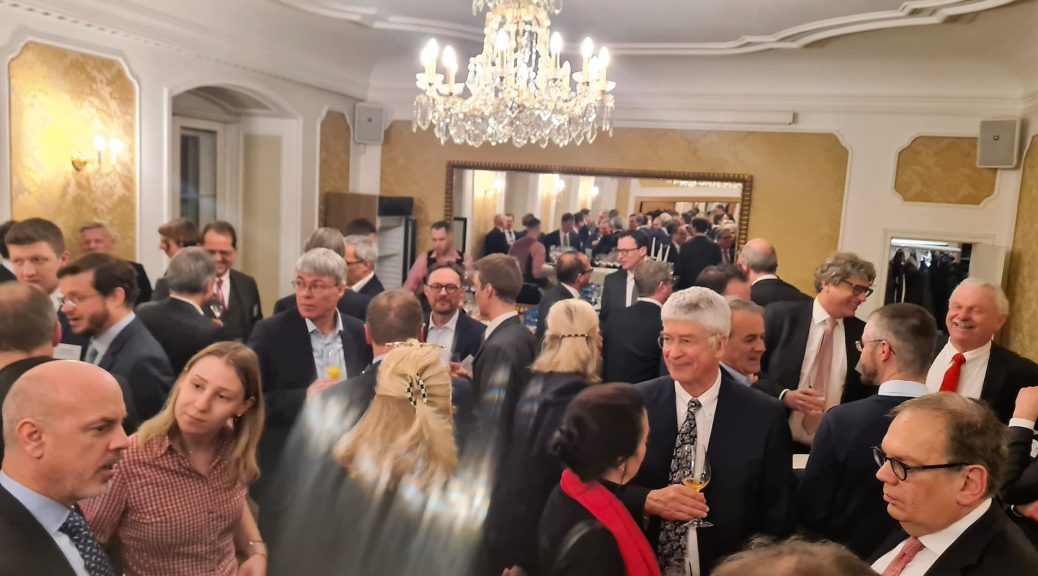
Conference Debriefing (35): FIW Symposium Innsbruck
PDF Version: Click here
Suggested Citation: Haucap, DKartJ 2023, 11-13
Those who are not part of the antitrust family in the DACH region will certainly associate the Tyrolean capital Innsbruck primarily with the Alps and winter sports and perhaps also think of the fantastic adventures of the spaceship Orion, whose protagonist, Major Cliff Allister McLane, was impersonated by actor Dietmar Schönherr, one of the prominent sons of the city of Innsbruck. Friends of antitrust law and competition economics, on the other hand, immediately think of the annual symposium of the Forschungsinstitut für Wirtschaftsverfassung und Wettbewerb (a research institute, FIW for short), which took place for the 56th time from 22 to 24 February 2023 and traditionally starts three days after the famous Rhineland carnival culminates in the big processions called “Rosenmontagszug”. That is good timing with regard to the not entirely insignificant antitrust community from the Rhineland – they are back to their senses. Prof. Dr. Justus Haucap was there and reports here.
After a two-year break (because of Corona, exactly), 120 legal scholars, economists, lawyers, enforcers and industry representatives met at the Hotel Grauer Bär to discuss current issues of antitrust law, or to complain, depending on one’s mood. Who was there or what exactly was it about? If you prefer a sober overview, please click here. If, on the other hand, you would like to listen to a subjectively coloured, highly distorted account, you can read on. Please watch out: I am also (still) the chairman of the Scientific Advisory Board of FIW – so the distorted presentation is guaranteed. But now to the point, dear readers.
The heads of the authorities
The informal start was made on Wednesday evening by the highly esteemed interim Director General of the Austrian Federal Competition Authority (BWB), Dr. Natalie Harsdorf-Borsch. At the reception hosted by the BWB, she pointed out to Andreas Mundt that the BWB had completed the sector enquiry into the wholesale trade in mineral oil in just three months. But as a host to the event, it is of course all right to pour the guests a drink. I also liked her comment on miscarriages of justice, that in these cases the court had now erred with legal certainty.
Formally, Andreas Mundt kicked off the conference on Thursday morning and spoke on “Current developments in the Bundeskartellamt’s antitrust practice”. The President of the Office first emphasised that despite the DMA, Section 19a of the German GWB, the competition act, would retain its importance. In the field of cartel prosecution, Mundt pointed out that worldwide – with the notable exception of Austria – leniency applications are declining. Therefore, the Bundeskartellamt is now pursuing a double strategy in cartel prosecution: On the one hand, there is a more intensive screening of markets in order to increase the probability of cartel detection, on the other hand, Mundt spoke out in favour of a privileged treatment up to exemption of leniency applicants with regard to claims for damages in relation to the other cartel applicants.
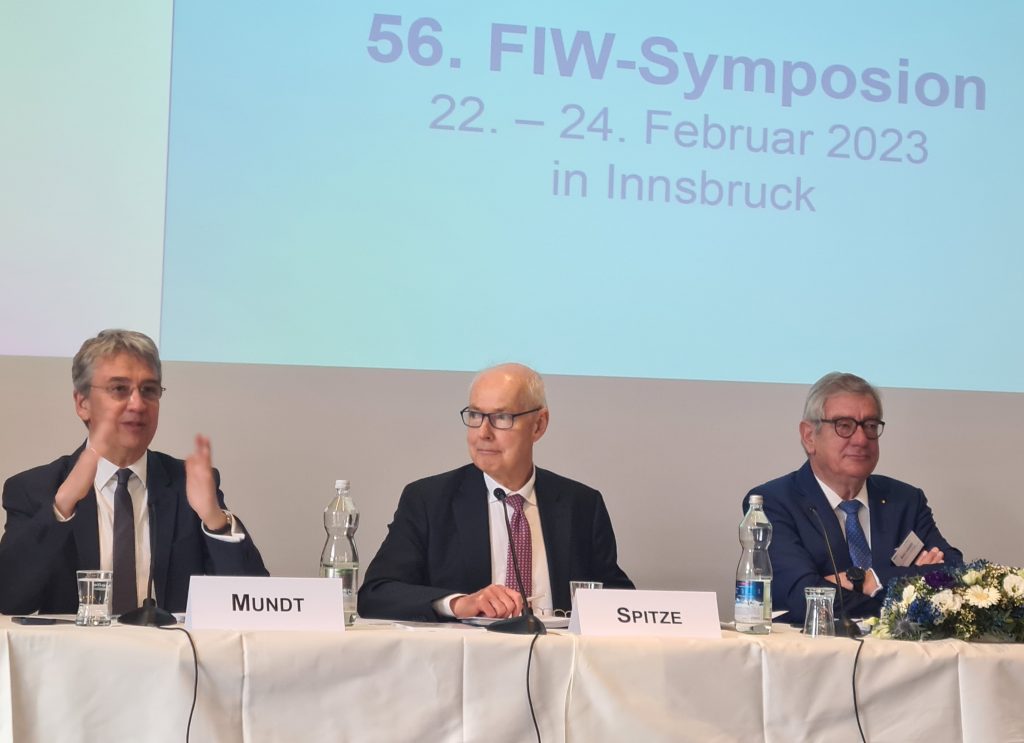
In the field of merger control, the President pointed out that as a “lawyer from Germany” he certainly had his problems with the European Commission’s interpretation of Article 22 of the EU Merger Regulation. How jurisdiction could arise from the referral of a merger by one competition authority without jurisdiction to another competition authority without jurisdiction is not yet clear to him. Mundt also raised the question of where the Bundeskartellamt itself wanted to head in the future. Although he was open to further expansions of the Bundeskartellamt – this is not really surprising – he was also concerned about the “core brand” of the Bundeskartellamt if more and more tasks were transferred to it.
Merger control beyond the thresholds
In the following panel, Natalie Harsdorf-Borsch (BWB), Konrad Ost (Vice-President of the Bundeskartellamt) and Birthe Panhans (DG Competition) discussed “Merger control outside the thresholds”, chaired by my colleague on the FIW Advisory Board, Torsten Körber (University of Cologne). The acting Director General of the BWB – perhaps still impressed by the meeting of academic competition economists at the BWB the previous week – presented numerous figures. Since 2015, there have been 14 applications under Article 22 of the ECMR in the EU. The BWB is the EU-wide frontrunner with four initial applications (out of a total of 14 applications). In addition, the BWB had joined three other applications, i.e. it had been involved in half of all cases. The Bundeskartellamt had filed three initial applications, France and Spain two each and Finland, Denmark and the UK one each. In addition, Harsdorf-Borsch referred (appropriate word in this context) to the joint guidance of the BWB and the Bundeskartellamt on transaction value thresholds. From November 2017 to December 2022, there were 121 merger projects in Austria that were notified due to the transaction value threshold. That is significantly less than 10 percent of the notified mergers in each year. Almost half of them were in digital markets and the healthcare sector.
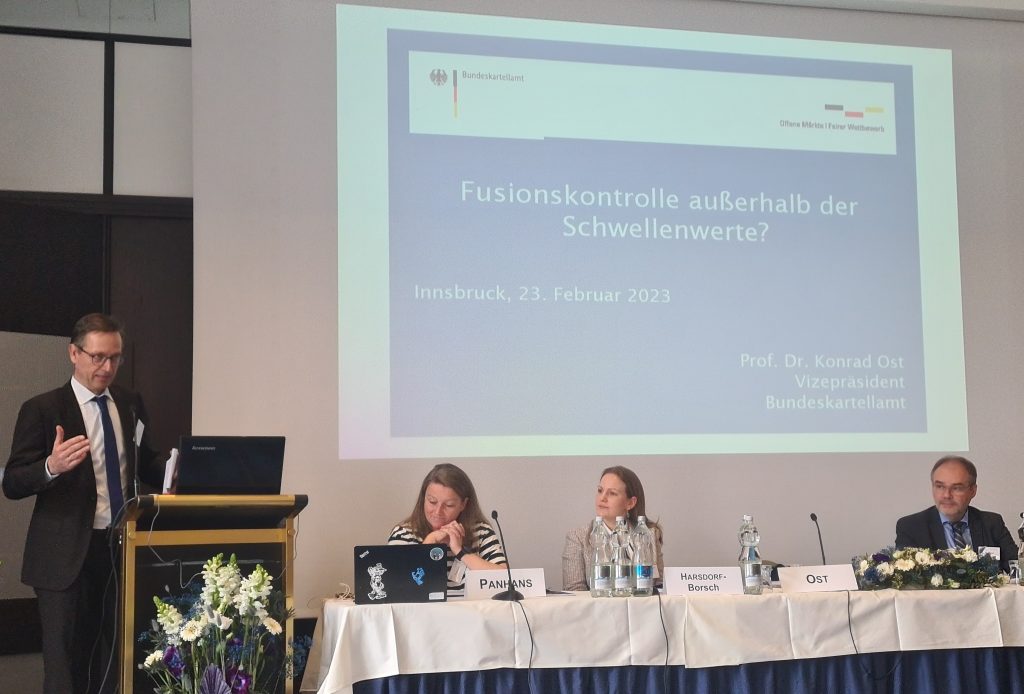
With the exception of two cases (Meta/Giphy and a transaction that was then withdrawn), all of these notifications were cleared in Phase I. With regard to Article 22 ECMR, however, the BWB intends to adhere to its previous practice of only referring cases under Article 22 ECMR to the Commission if there is also a national duty to notify in Austria. Konrad Ost took a very similar view. Birthe Panhans (EU Commission), on the other hand, referred to the necessity of being able to better control potential killer acquisitions. She referred to the Commission’s guidelines on the subject and in particular to paragraph 19 of the guidelines, which lists indicators that are used to assess whether a killer acquisition could exist. Panhans mentioned the transaction value as one indicator (among many), innovation and access to competition-relevant assets (such as data). So far, only one case out of 35 merger proposals examined had been examined more intensively.
Competition policy in the next 10 years
After the lunch break, I had my appearance on stage and was allowed to speak about (some of) the “challenges for competition policy in the next 10 years”, specifically about digital markets, sustainability and labour markets. In the area of digital markets, my plea is to wait with a possible tightening of merger control until we have more clarity about what effect the now significantly improved abuse control (especially through DMA, Sections 19a and 20 GWB) will have. In principle, the significantly upgraded behavioural control seems to me to be better suited to prevent possible abuse of market power. For competition authorities, at least in digital markets, it should hardly be possible to reliably identify killer acquisitions ex ante or even ex post. The counterfactual scenario is far too unclear for this. This is more feasible due to the comparatively long research pipeline in the pharmaceutical industry or agrochemicals. But there, this can be addressed today without tightening merger control, for example by introducing the transaction value threshold as in Germany and Austria.
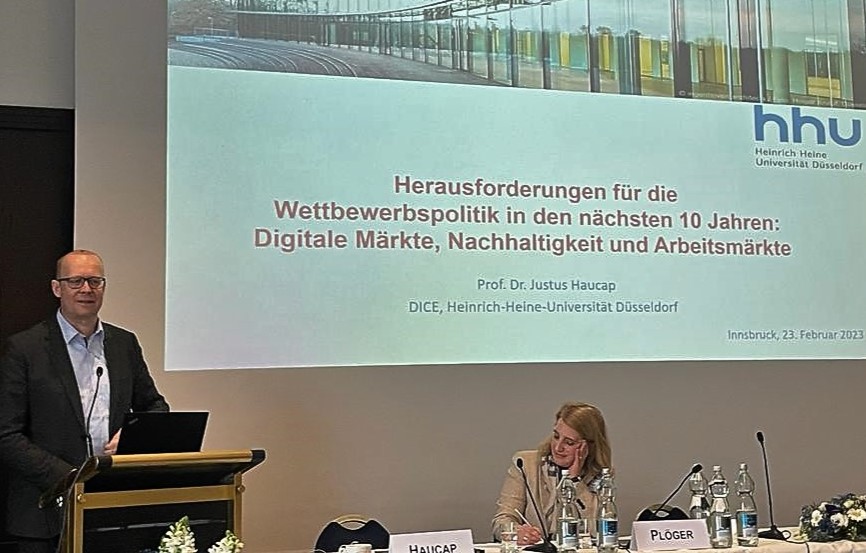
I also expressed scepticism about imposing ever more targets on competition authorities, such as sustainability or labour market targets. The latter is just beginning to emerge in the USA, where there is a lively debate on whether labour market concerns such as employee pay should also be taken into account in merger control proceedings.
The 11th GWB Amendment
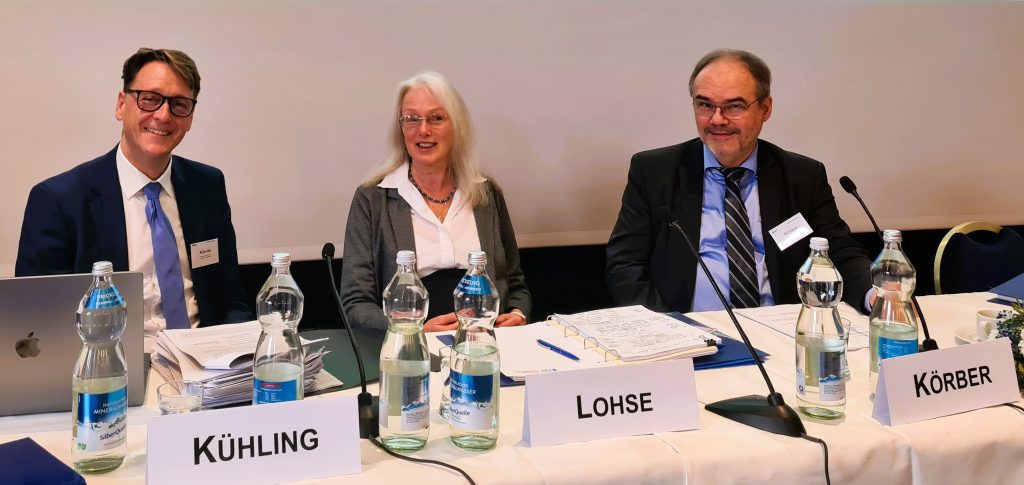
Finally, the planned 11th amendment of the German competition act GWB was discussed directly. Jürgen Kühling (Monopolies Commission, University of Regensburg) argued with Torsten Körber, who stood in for Stefan Thomas (Tübingen), who was prevented from attending at short notice, about “Disturbance of Competition as a New Parameter for Structural Interventions by the Competition Authority”. Both had in common the concern to bring about improvements compared to the current draft bill. While the Chairman of the Monopolies Commission wanted to see the role of his Commission strengthened (and repeatedly praised the Commission’s 58th special report on the then Brüderle draft – I liked it very much, of course 😉 ) and also insisted on compensation, Torsten Körber argued for more fundamental changes, such as the introduction of the “three-criteria test” known from telecoms regulation (section 11 in the German telco act) and a more precise and narrower definition of the concept of distortion of competition, so that the GWB does not become a competition administration law. Thorsten Käseberg from the Ministry was then allowed to storm the podium and join the two colleagues in defense of the draft. He was open to improved compensation, but not to the introduction of the “three criteria test”, which in his view did not fit conceptually.
Gone with the Chancellor
On Friday morning – after a lavish dinner in the Kaisersaal of the Stiftskeller (see our photo at the top) – Martina Merz, CEO of thyssenkrupp AG, was supposed to speak. However, she had to be replaced at short notice by her Group General Counsel Sebastian Lochen in order to go on a trip abroad with Chancellor Scholz. That excuse was actually well suited to the topic of her speech, which focused on the new global challenges posed by China, but also by the USA (keyword: Inflation Reduction Act). I can’t help but refer to our podcast episode with the highly esteemed colleague Katharina Erhardt (her surname alone, reminding us of a former German minister for economics, should be an incentive for all friends of competition to listen in!)
Cartel damages at the BGH
Let’s not digress. We continued with Wolfgang Kirchhoff, known as the presiding judge at the Federal Supreme Court, who spoke about the current case law of the Cartel Senate. Specifically, it was about two judgements on cartel damages (judgement of 28.6.2022, KZR 46/20 – Stahl-Strahlmittel and judgement of 29.11.2022, KZR 42/20 – Schlecker) as well as a decision of 27.9.2022 (KZB 75/21 – Kartellrecht im Schiedsverfahren). In the Stahl-Strahlmittel judgement, the question is whether a buyer may have suffered cartel damage if it did not buy directly from cartel participants but from a subsidiary of a cartel participant. As Kirchhoff explained, due to possible price umbrella effects, it is sufficient that goods were purchased which were the subject of the cartel agreement – especially if the seller was the subsidiary of a cartel participant. The fact that the prices paid and price components (scrap surcharge, energy surcharge) were below the cartel prices was not sufficient to exclude a cartel-related price effect, because without a cartel it might have been possible to negotiate even better prices.
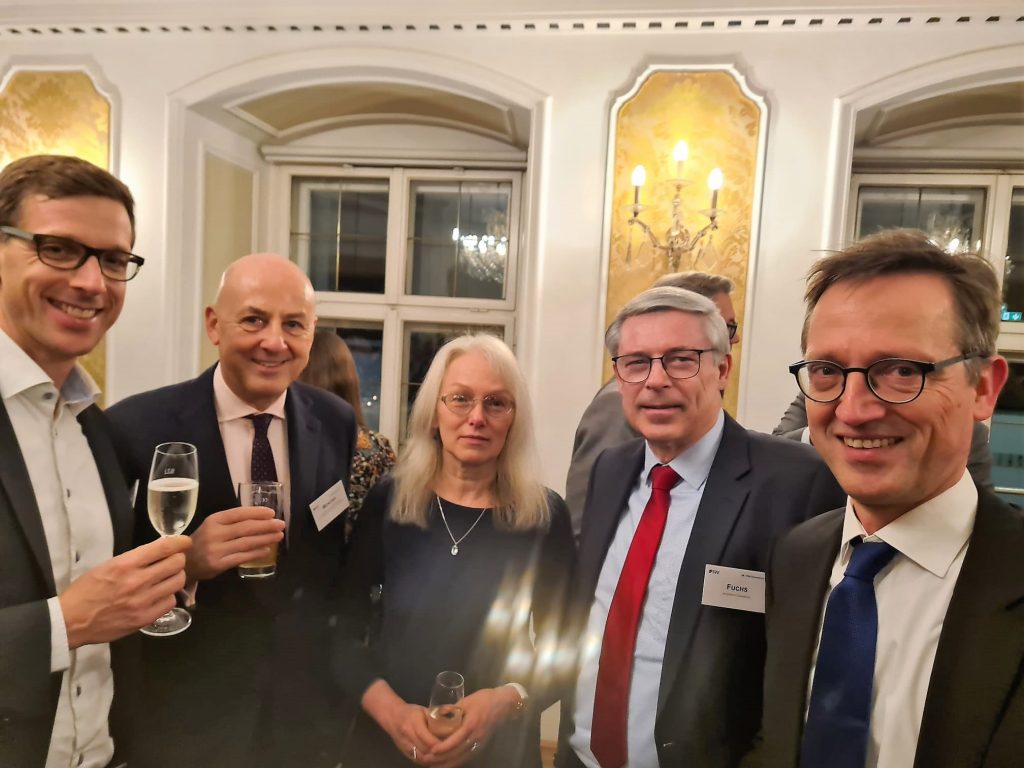
In the Schlecker case, Kirchhoff stated that “if secret information is passed on, there is a high probability that the market behaviour of the cartel participants does not correspond to the hypothetical market behaviour”. Further: “If the secret information concerns price-setting behaviour, the prices achieved after the exchange of information are very likely to be on average higher than those that would otherwise have been formed.” For economists, this is a particularly relevant message: “Methodological errors and faulty fact-finding in party expert opinions do not justify rejecting applications for such regression analyses or refraining from obtaining them ex officio”. It seems that bad expert opinions are still better than no expert opinion at all for cartel victims.
Finally, on the question of antitrust review of arbitral awards, Kirchhoff made it unmistakably clear that – despite criticism voiced by some – no legal system could accept violations of its most fundamental norms (and he counted in particular Sections 19, 20, 21 GWB among these) being confirmed by its own courts. Therefore, a review of arbitral awards on the merits was necessary.
The Innsbruck symposium ended with reports from three FIW working groups on the Competition Policy Model (rapporteur Justus Herrlinger, DLA Piper UK), on Criteria for Restraints of Competition (rapporteur Georg Böttcher, Siemens AG) and Sustainability and Antitrust Law (rapporteur Georg Götz, Justus Liebig University Giessen). More about this soon on the FIW website.
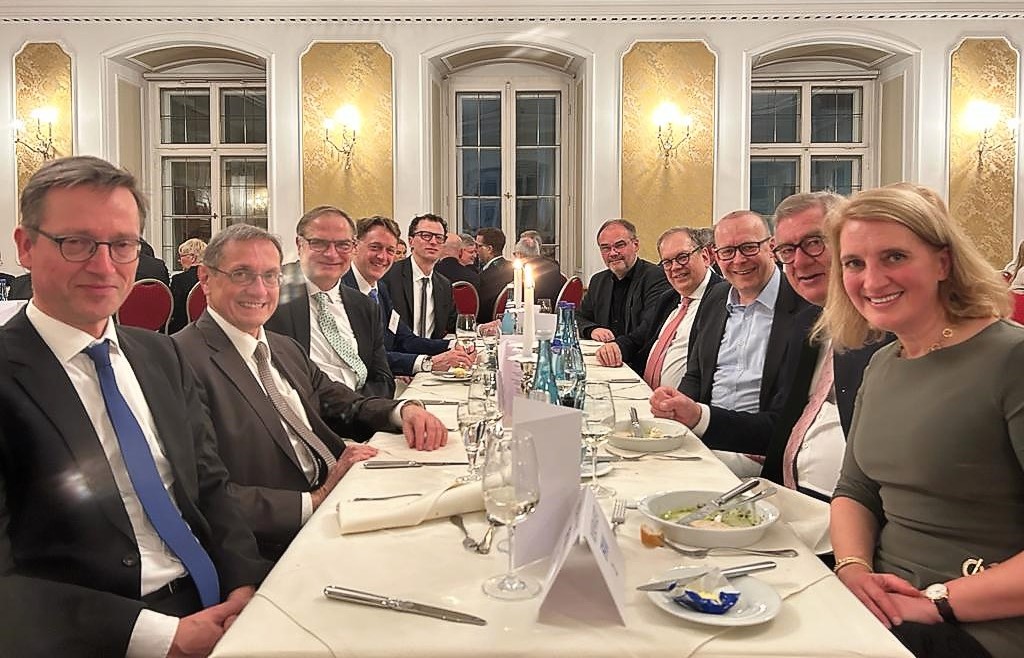
Prof. Dr. Justus Haucap is Director of the Düsseldorf Institute for Competition Economics (DICE) at the Heinrich Heine University Düsseldorf.
The photo shows him at the VIP table: From left to right: Konrad Ost, Horst Satzky, Wolfgang Kirchhoff, Jürgen Kühling, Sebastian Lochen, Torsten Körber, Wolfgang Kopf, Justus Haucap, Arndt Kirchhoff, Iris Plöger.
One thought on “Conference Debriefing (35): FIW Symposium Innsbruck”
Sehr schöner und auch schneller Bericht zum erfolgreichen FIW Symposion 2023.